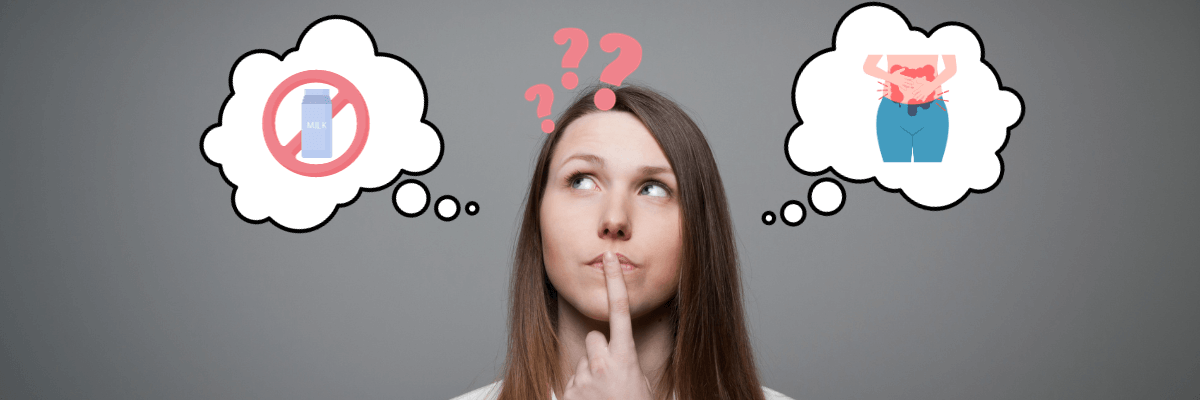
Common digestive disorders characterise lactose intolerance and cow's milk protein allergy (APLV). Yet there are fundamental differences between these conditions, which can have undesirable and even disabling effects. Lactolerance helps you to avoid confusing lactose intolerance with CMPA, so that you can make a clear diagnosis of your digestive problems and develop appropriate eating habits.
What is lactose intolerance or alactasia?
Lactose intolerance results in an inability to digest lactosewhich is the carbohydrate in milk. This complex sugar can only be digested if it breaks down into the two simple sugars glucose and galactose. In the human body, this breakdown is normally carried out by lactase, an enzyme produced in the small intestine. However, the bodies of people with lactose intolerance produce little or no lactase, which is the cause of their partial or total food intolerance to lactose-containing products.
The most common digestive problems associated with lactose intolerance are burbling, abdominal pain, bloating, flatulence and diarrhoea. Nausea, vomiting, constipation and migraines can also occur in lactose-intolerant people.
➡️ Click here to find out more about lactose intolerance
What is cow's milk protein allergy?
Allergy to cow's milk protein corresponds to a disturbance in the immune system. When lgE-type antibodies produced by the body come into contact with traces of cow's milk proteins, they trigger an (almost) immediate rejection after ingestion of the product made up of these proteins. Very often, the proteins contained in other animal milks - sheep's, goat's, etc. - cause the same problems.
Causing digestive problems similar to those of lactose intolerance such as diarrhoea, vomiting, constipation and reflux, allergy to cow's milk protein is also responsible for much more violent reactions such as respiratory problems, skin reactions and classic allergic symptoms such as fatigue and sleep disorders.
How do I know if I'm lactose intolerant or allergic to cow's milk protein?

First of all, you should know that Allergy to cow's milk protein mainly affects infants and children under the age of 3.lactase, before disappearing naturally in 80% of individuals with this food allergy. Alactasia, on the other hand, is generally seen in adults, as lactase activity declines more or less significantly during childhood and adolescence. It is estimated that around 75% of the world's population is lactose intolerant, and that this condition is often hereditary in origin.
What's more, lactose intolerance is generally accompanied by later and more moderate symptoms compared with cow's milk protein allergy. The quantity and/or intensity of the problems experienced by lactose-intolerant people are proportional to the quantity of lactose ingested in the case of partial alactasia, whereas CMPA invariably leads to intense reactions as soon as milk proteins are consumed.
We recommend that you carry out an avoidance test at home to identify the foods that are likely to bother you or your baby. In all cases, follow your doctor's recommendations before adopting or offering your child a lactose-free and/or cow's milk protein-free diet.
👇 Are you lactose intolerant? Discover the Discovery pack and rediscover your digestive peace of mind! 👇

Hello, I'm Vincent
Like you, I'm lactose intolerantI know exactly what you're going through and the difficulties you encounter on a daily basis. For over 10 years, I've been helping our customers to use our dietary supplements and giving advice and tips on how to improve their digestive comfort. I'm also a keen cook and gourmet, so you'll find my favourite recipes for a lactose-free diet in this blog.
Lactose intolerance is not inevitable! With LACTOLERANCE you can digest with complete peace of mind






